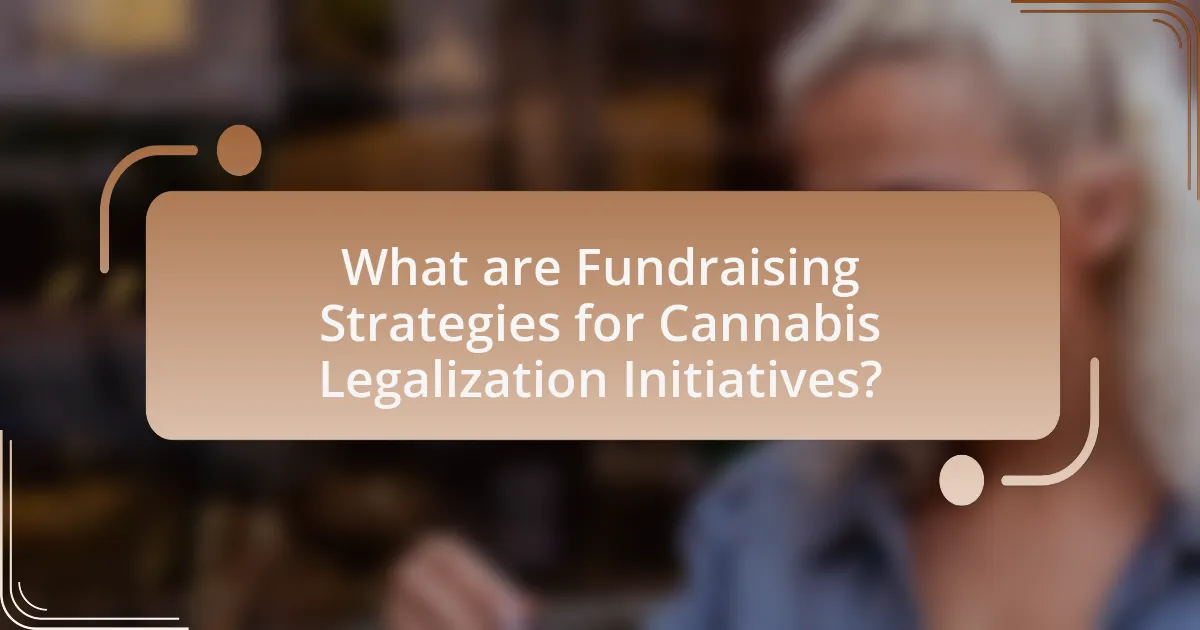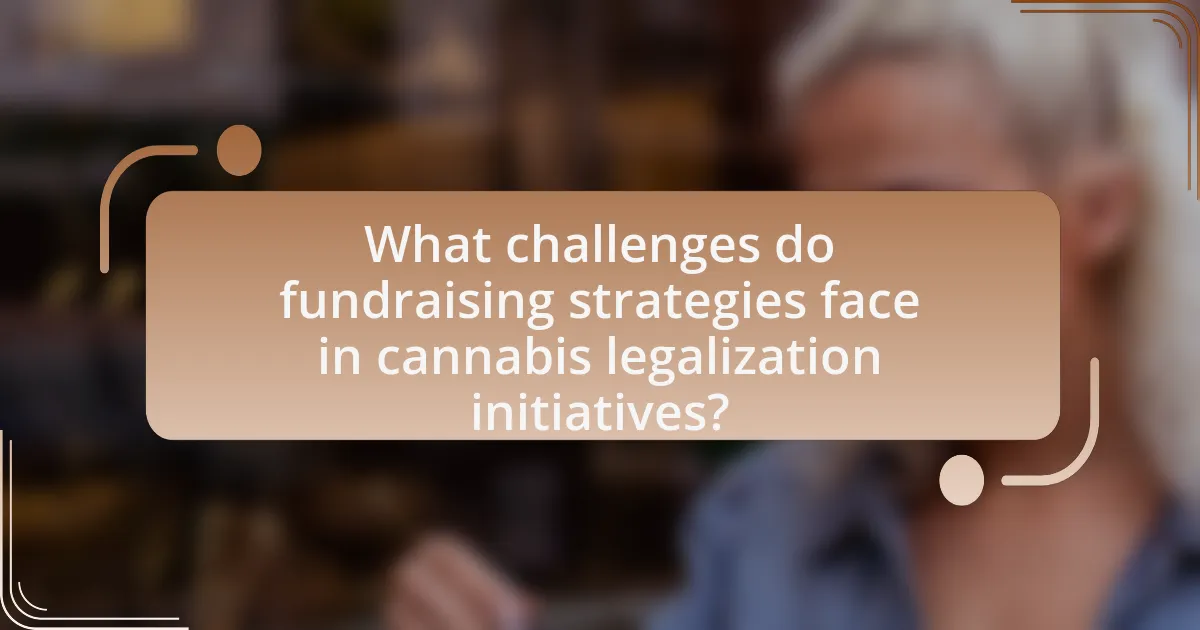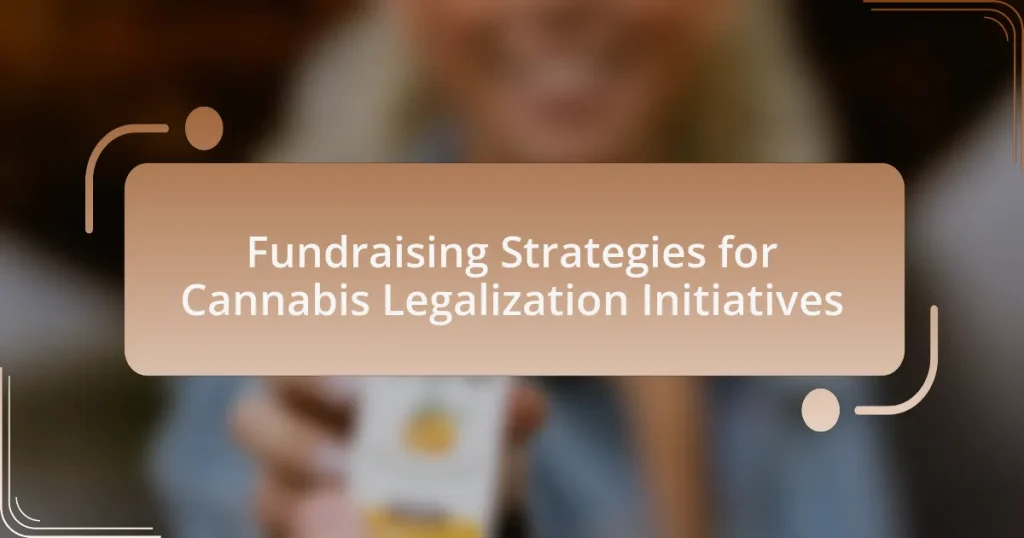The article focuses on fundraising strategies for cannabis legalization initiatives, highlighting methods such as grassroots campaigns, online crowdfunding, and partnerships with advocacy organizations. It discusses the impact of these strategies on the success of legalization efforts, emphasizing the importance of financial resources for advocacy, outreach, and public education. Key components of effective fundraising, regional differences in strategies, and the challenges posed by legal restrictions and banking issues are also examined. Additionally, the article outlines best practices for enhancing fundraising efforts, including transparency, donor engagement, and effective communication of organizational missions.

What are Fundraising Strategies for Cannabis Legalization Initiatives?
Fundraising strategies for cannabis legalization initiatives include grassroots campaigns, online crowdfunding, and partnerships with advocacy organizations. Grassroots campaigns mobilize local supporters to contribute small amounts, creating a broad base of funding and community engagement. Online crowdfunding platforms, such as GoFundMe or Kickstarter, allow for reaching a wider audience, enabling individuals to donate directly to specific initiatives. Collaborating with established advocacy organizations can provide access to larger donor networks and resources, enhancing fundraising efforts. According to a report by the Marijuana Policy Project, successful initiatives often raise significant funds through these methods, demonstrating their effectiveness in supporting legalization efforts.
How do these strategies impact the success of legalization efforts?
Fundraising strategies significantly enhance the success of cannabis legalization efforts by providing essential financial resources for advocacy, outreach, and campaign activities. Effective fundraising enables organizations to mobilize support, conduct research, and engage in public education campaigns, which are critical for influencing public opinion and policymakers. For instance, successful fundraising campaigns have been linked to increased voter turnout and support for legalization measures, as seen in states like Colorado and Washington, where well-funded initiatives led to successful ballot outcomes. Additionally, financial backing allows for strategic advertising and grassroots mobilization, which are vital in countering opposition and ensuring that legalization efforts gain traction.
What are the key components of effective fundraising strategies?
The key components of effective fundraising strategies include clear goals, targeted messaging, diverse funding sources, and strong donor relationships. Clear goals provide a specific direction and measurable outcomes, which are essential for motivating potential donors. Targeted messaging ensures that the communication resonates with the audience, highlighting the importance of the cause, such as cannabis legalization initiatives. Diverse funding sources, including individual donations, grants, and corporate sponsorships, reduce reliance on a single income stream and enhance financial stability. Strong donor relationships foster trust and encourage ongoing support, which is crucial for sustained fundraising success. These components are supported by research indicating that organizations with clear objectives and diversified funding strategies tend to achieve higher fundraising outcomes.
How do fundraising strategies differ across various regions?
Fundraising strategies for cannabis legalization initiatives differ significantly across regions due to varying legal frameworks, cultural attitudes, and economic conditions. For instance, in regions where cannabis is fully legalized, such as California, fundraising efforts often focus on large-scale donations from established cannabis businesses and investors, leveraging a more mature market. Conversely, in areas where cannabis is still illegal or only partially legalized, such as certain states in the Midwest, grassroots fundraising through community events and small donations becomes essential, as public support is still being cultivated. Additionally, regions with strong advocacy groups, like Colorado, utilize organized campaigns and social media outreach to mobilize supporters, while areas with less established networks may rely more on traditional fundraising methods, such as direct mail campaigns. These regional differences highlight the importance of tailoring fundraising strategies to align with local contexts and legal environments.
Why is fundraising crucial for cannabis legalization initiatives?
Fundraising is crucial for cannabis legalization initiatives because it provides the necessary financial resources to support advocacy efforts, campaign activities, and public education. These initiatives often require substantial funding to cover costs such as legal fees, marketing, outreach programs, and lobbying efforts aimed at influencing policymakers. For instance, in 2020, the campaign to legalize cannabis in New Jersey raised over $1 million, demonstrating the financial commitment needed to effectively mobilize support and navigate the legislative process. Without adequate fundraising, these initiatives may struggle to gain traction, limiting their ability to reach voters and secure legislative victories.
What financial needs do legalization initiatives typically have?
Legalization initiatives typically require substantial funding for campaign activities, legal fees, public outreach, and regulatory compliance. These financial needs arise from the necessity to conduct research, gather signatures for ballot measures, and promote awareness among voters. For instance, the 2016 California Proposition 64 campaign raised over $20 million to cover these expenses, highlighting the significant financial commitment involved in such initiatives.
How does funding influence public perception and support?
Funding significantly influences public perception and support by shaping the visibility and messaging of initiatives. When substantial financial resources are allocated to cannabis legalization campaigns, they enable extensive outreach efforts, including advertising, community engagement, and educational programs. For instance, a study by the Marijuana Policy Project found that states with well-funded campaigns saw higher public support for legalization, as effective messaging can counteract misinformation and highlight benefits. Additionally, funding allows for the hiring of skilled professionals who can craft persuasive narratives, further swaying public opinion in favor of legalization efforts.

What types of fundraising strategies are commonly used?
Commonly used fundraising strategies include individual donations, crowdfunding, events, and corporate sponsorships. Individual donations often come from supporters who believe in the cause, while crowdfunding leverages online platforms to gather small contributions from a large number of people. Events, such as galas or auctions, not only raise funds but also increase awareness and engagement. Corporate sponsorships provide financial support in exchange for brand visibility, which can be particularly effective in initiatives related to cannabis legalization, as companies seek to align with progressive movements. These strategies are validated by numerous successful campaigns that have utilized them to secure funding for legalization efforts.
How can grassroots campaigns effectively raise funds?
Grassroots campaigns can effectively raise funds by leveraging community engagement and utilizing digital platforms for outreach. Engaging local supporters through events, social media, and crowdfunding platforms allows campaigns to tap into a wider audience and encourage small donations. For instance, a study by the Pew Research Center found that 69% of Americans support cannabis legalization, indicating a strong potential donor base. Additionally, campaigns can enhance their fundraising efforts by creating compelling narratives that resonate with the community, thus fostering a sense of ownership and urgency around the cause.
What role do community events play in fundraising?
Community events play a crucial role in fundraising by fostering engagement and building relationships within the community. These events create opportunities for individuals to connect with the cause, increasing awareness and support for cannabis legalization initiatives. For instance, a study by the Nonprofit Research Collaborative found that organizations that host community events often see a significant increase in donations, with 70% of participants reporting that events enhance donor relationships. This direct interaction not only raises funds but also cultivates a sense of community ownership and advocacy for the cause.
How can social media be leveraged for fundraising efforts?
Social media can be leveraged for fundraising efforts by creating targeted campaigns that engage users and encourage donations. Platforms like Facebook, Instagram, and Twitter allow organizations to reach a broad audience, share compelling stories, and utilize features such as donation buttons and fundraising events. For instance, a study by the Pew Research Center found that 69% of adults in the U.S. use social media, providing a vast potential donor base. Additionally, social media enables real-time interaction, allowing organizations to respond to inquiries and build relationships with supporters, which can lead to increased contributions.
What are the advantages of using online fundraising platforms?
Online fundraising platforms offer several advantages, including broader reach, lower costs, and enhanced convenience. These platforms enable organizations to connect with a global audience, significantly increasing the potential donor base compared to traditional fundraising methods. For instance, a study by the Nonprofit Research Collaborative found that online fundraising can lead to a 30% increase in donations due to the ease of sharing campaigns through social media and email. Additionally, online platforms typically have lower operational costs, allowing more funds to be directed toward the cause. The convenience of online donations, which can be made anytime and anywhere, also encourages more contributions, as evidenced by the fact that 54% of donors prefer to give online according to the 2021 Global Trends in Giving Report.
Which online platforms are most effective for cannabis initiatives?
The most effective online platforms for cannabis initiatives include GoFundMe, Kickstarter, and Indiegogo. These platforms have been utilized successfully for fundraising campaigns related to cannabis legalization, with GoFundMe being particularly popular due to its user-friendly interface and broad reach. For instance, a campaign on GoFundMe raised over $1 million for cannabis reform efforts in California, demonstrating the platform’s effectiveness in mobilizing financial support. Additionally, Kickstarter and Indiegogo have hosted numerous projects that focus on cannabis-related products and advocacy, further proving their utility in this sector.
How can crowdfunding campaigns be structured for success?
Crowdfunding campaigns can be structured for success by clearly defining the project goals, engaging storytelling, and offering attractive rewards. Clear project goals ensure potential backers understand the purpose and impact of their contributions, which is crucial for building trust and motivation. Engaging storytelling captures the audience’s attention, making them emotionally invested in the campaign; for instance, sharing personal narratives or community benefits can enhance relatability. Offering attractive rewards incentivizes contributions, with successful campaigns often providing tiered rewards that appeal to various backer levels. According to a study by the University of Pennsylvania, campaigns that effectively communicate their mission and engage with backers tend to raise 20% more funds than those that do not.

What challenges do fundraising strategies face in cannabis legalization initiatives?
Fundraising strategies for cannabis legalization initiatives face significant challenges primarily due to legal restrictions and banking issues. Many financial institutions remain hesitant to engage with cannabis-related businesses due to federal illegality in the United States, limiting access to traditional banking services and investment opportunities. This creates barriers for fundraising efforts, as organizations struggle to secure necessary capital from conventional sources. Additionally, the stigma surrounding cannabis can deter potential donors and investors, further complicating fundraising initiatives. According to a 2021 report by the National Cannabis Industry Association, 68% of cannabis businesses reported difficulties in accessing banking services, highlighting the systemic challenges faced in fundraising for legalization efforts.
How do legal restrictions impact fundraising efforts?
Legal restrictions significantly hinder fundraising efforts for cannabis legalization initiatives by limiting the sources and methods of financial support. These restrictions often include regulations on contributions from certain entities, such as corporations or individuals with criminal records related to cannabis, which reduces the pool of potential donors. For instance, in states where cannabis remains illegal, organizations may face challenges in securing funding from traditional financial institutions, as banks often refuse to work with cannabis-related businesses due to federal regulations. Additionally, compliance with state and federal laws can increase administrative costs and complexity, further straining fundraising capabilities. According to a report by the National Organization for the Reform of Marijuana Laws (NORML), these legal barriers can lead to a decrease in overall campaign funding, ultimately impacting the effectiveness of advocacy efforts for legalization.
What are the implications of banking regulations on fundraising?
Banking regulations significantly impact fundraising by restricting access to financial services for cannabis-related initiatives. These regulations often prevent banks from providing accounts or loans to businesses involved in the cannabis industry due to its federal illegality in the United States. Consequently, fundraising efforts may rely heavily on cash transactions, which complicates tracking and increases security risks. A report by the Financial Crimes Enforcement Network (FinCEN) highlights that the lack of banking access leads to challenges in compliance with anti-money laundering laws, further complicating fundraising for cannabis legalization initiatives.
How can initiatives navigate these legal challenges?
Initiatives can navigate legal challenges by ensuring compliance with existing laws and regulations governing cannabis fundraising. This involves conducting thorough legal research to understand the specific requirements in their jurisdiction, such as registration, reporting, and contribution limits. For example, in states like California, initiatives must adhere to the Political Reform Act, which mandates transparency in campaign financing. Additionally, initiatives can seek legal counsel to develop strategies that mitigate risks associated with fundraising activities, ensuring that all fundraising efforts align with state and federal laws. By proactively addressing these legal frameworks, initiatives can effectively reduce the likelihood of legal disputes and enhance their fundraising efforts.
What ethical considerations should be taken into account?
Ethical considerations in fundraising for cannabis legalization initiatives include transparency, accountability, and the potential impact on vulnerable populations. Transparency requires clear disclosure of funding sources and how donations will be utilized, ensuring that stakeholders understand the financial backing of the initiative. Accountability involves adhering to legal regulations and ethical standards to prevent corruption and misuse of funds. Additionally, the potential impact on vulnerable populations, such as low-income communities and individuals with prior cannabis-related convictions, must be considered to avoid exacerbating social inequalities. These considerations are crucial for maintaining public trust and fostering a responsible approach to cannabis legalization efforts.
How can transparency in fundraising build trust with supporters?
Transparency in fundraising builds trust with supporters by ensuring that donors can see how their contributions are utilized and the impact they create. When organizations openly share financial reports, project outcomes, and spending details, they demonstrate accountability, which fosters confidence among supporters. Research indicates that 85% of donors are more likely to support organizations that provide clear information about their fundraising efforts and expenditures. This level of openness not only reassures supporters about the integrity of the organization but also encourages ongoing engagement and contributions, ultimately enhancing the effectiveness of fundraising strategies for initiatives like cannabis legalization.
What are the potential pitfalls of unethical fundraising practices?
Unethical fundraising practices can lead to significant reputational damage for organizations involved in cannabis legalization initiatives. Such practices may result in loss of donor trust, as supporters may withdraw their contributions if they perceive dishonesty or manipulation. Additionally, unethical fundraising can attract legal scrutiny, potentially leading to fines or sanctions, as seen in cases where organizations failed to comply with transparency regulations. Furthermore, these practices can undermine the overall mission of cannabis legalization by alienating stakeholders and damaging public perception, which is critical for advocacy efforts.
What best practices can enhance fundraising strategies for cannabis initiatives?
To enhance fundraising strategies for cannabis initiatives, organizations should prioritize building strong community relationships and leveraging digital marketing. Establishing connections with local stakeholders fosters trust and encourages community support, which is crucial for fundraising success. Additionally, utilizing targeted digital marketing campaigns can effectively reach potential donors, as studies show that 70% of online donations occur through social media platforms. Engaging storytelling that highlights the benefits of cannabis legalization can also resonate with audiences, increasing the likelihood of contributions.
How can organizations effectively communicate their mission to attract donors?
Organizations can effectively communicate their mission to attract donors by clearly articulating their goals, demonstrating impact, and engaging with potential supporters through multiple channels. Clear messaging that outlines the specific objectives of cannabis legalization initiatives helps potential donors understand the importance and urgency of the cause. For instance, organizations can use storytelling to illustrate how their efforts have positively affected communities, thereby showcasing tangible results. Engaging content, such as videos and infographics, can enhance understanding and retention of the mission. Additionally, utilizing social media platforms and email campaigns allows organizations to reach a broader audience, fostering a sense of community and encouraging donor participation. Research indicates that organizations that effectively communicate their mission can increase donor engagement by up to 50%, highlighting the importance of strategic communication in fundraising efforts.
What role does donor engagement play in long-term fundraising success?
Donor engagement is crucial for long-term fundraising success as it fosters relationships that lead to sustained financial support. Engaged donors are more likely to contribute repeatedly, increasing the lifetime value of each donor. Research indicates that organizations with high donor engagement levels see retention rates of up to 60%, compared to only 20% for those with low engagement. This demonstrates that effective communication, personalized outreach, and recognition of donor contributions significantly enhance donor loyalty and commitment, ultimately driving the success of fundraising initiatives, particularly in niche areas like cannabis legalization.


